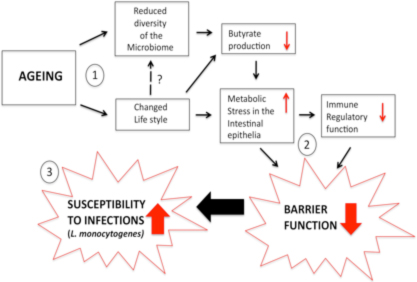Ageing and the gastrointestinal microbiome: effects on immunology and cognitive function
About this project
Project information
Project status
Completed
Contact
Research subject
Research environments
Elderly represents the fastest growing class of the population in the Western world. Compared with young or middle-aged adults, elderly are more susceptible to infectious disease, particularly influenza, pneumonia and urinary tract infections. The increased rates of infectious disease, autoimmune disorders and inappropriate inflammatory conditions among the elderly all translate to increased rates of clinical visits and need for home care nursing, and hospitalization. In addition, an increased basal state of inflammation may also hamper the development or resolution of immune responses to pathogens.
Human ageing is known to be associated with a reduced diversity of the gut microbiome. Even though the findings remain strongly country dependent, a reduction in the butyrate producing firmicutes phyla and Bifidobacteria have been reported.
Despite, extensive research in the field it remains largely unknown how a reduced microbiome influences the immune system in the elderly host. Given the importance the microflora has for the postnatal development of the immune system it is essential to identify the relationship between the microbiome and the declining immune functions in the other spectrum of life, e.g. the elderly. We postulate that an altered flora with reduced diversity induces a dysfunctional immune regulation in the elderly host by favouring a state of metabolic stress in the gut. It is essential to thoroughly elucidate this connection as this will serve as the foundation in the development of potent and cost effective tools to strengthen the elderly hosts immune function to better combat infections.
The overall purpose is to elucidate if a diminished diversity of the gut microbiome leads to a compromised intestinal barrier function in the elderly host by a) inducing metabolic stress (e.g. increased levels of reactive oxygen species (ROS)) in the intestinal epithelia and b) serve as a main contributor to the dysfunctional immune regulation termed immunosenescence. The dysfunctional barrier in the elderly results in an increased susceptibility to infections (fig 1). This project is performed in close conjunction with the ELROY project, which evaluates the potential of a specific probiotic species to strengthen the gut barrier among elderly.
Fig.1 Overview of the project. Hypotheses are included as circled numbers. (1) Ageing is associated with a loss of beneficial bacteria. This is due to the ageing process it self as well as life style changes with reduced physical activity and altered diet. Loss of beneficial bacteria leads to an increased level of metabolic stress in the intestinal epithelia. (2) This results in a dysfunctional intestinal barrier, due to disturbances of the intricate immunology of the mucosa, with an accumulation of T-regulatory cells, as well as down regulation of the longevity transcription factor FoxO3a. (3) The compromised barrier results in an increased susceptibility to food borne patoghens like Listeria monocytogenes.


